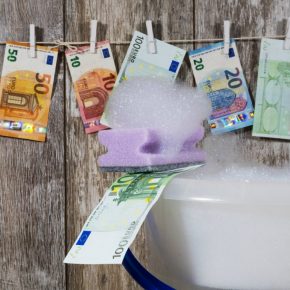
(Bru-nO, CC)
Vienna Initiative has helped the Balkan region to tackle the worst stage of the global economic crisis. The anniversary conference was organized together with the annual meeting of the High Forum, where different working groups presented their current work. The High Forum has looked at the impact of the fight against money laundering and terrorist financing (AML) in the Central and Southeast Europe. The availability of sustainable funding in the region was at the centre of attention during the discussions.
The issue of money laundering is particularly relevant in some Southeast European countries, such as Serbia. AML is a global problem, and Serbia certainly is not an exception. How much is lost due to this criminal activity is best shown by the fact that only from tax evasion the budget of Serbia has been damaged by EUR462.3m, according to the latest national report „Assessment of Money Laundering and Threat Assessment from Financing Terrorism”. Recent annual report for 2018 gives a thorough analysis of the criminal offenses classified as high-level threats of AML and defined as taxable criminal offenses, misuse of the position of the responsible person, abuse of office and unauthorized production and marketing of narcotic drugs. In the period from 2013 to 2017, 24.61 per cent of a total number of persons processed due to execution of the criminal money laundering were members of organized criminal groups. The growing threat in terms of AML is the high-tech crime, and especially business fraud by email (BEC — Business E-mail Compromise). The greatest number of AML offenses were committed in domestic jurisdiction, which is why the threat is assessed as high.
The sectors most exposed to AML threats are the real estate sector, the organizational sector, games of chance and the financial sector, followed by the exchange and professional services sectors. Serbia’s ability to defend against AML (national combat ability) is rated as „medium”. The national vulnerability, in addition to the ability of the state to defend itself against the AML, also affects the vulnerability of above mentioned sectors.
The first public presentation of the Risk Assessment was held in the Serbian Chamber of Commerce on September 2018. With the Risk Assessment, the Action Plan for the implementation of the recommendations was presented. Its work has already had positive outcomes. Serbia has made significant progress in implementing the Moneyval recommendations, the Council of Europe’s monitoring body for the prevention of AML. In December of this year, Belgrade and the Council of Europe should submit a new progress report.
Unlike the report of April 2016, when ten recommendations made by Moneyval were assessed as „partially fulfilled” or „not completed”, the latest report states that there are no recommendations identified as „unfulfilled”. As explained by the Council of Europe, as long as Serbia is in the process of evaluating FATF (the Financial Action Task Force, an intergovernmental organization for the fight against money laundering and terrorist financing), experts of „Moneyval” do not provide additional comments. The president of the Serbian Chamber of Commerce, Marko Čadež, told the Serbian media that good news is a better rating of Serbia in this field. „It seems that in the last few months, the Ministry of Finance, and especially the new Minister of Finance, have made great efforts to eliminate obstacles that may have been the problems in communicating with international institutions. So much has been done and it is important that the Ministry of Finance is now focused on this issue, because it affects, of course, how Serbia is viewed as an investment destination, „said Mr. Čadež.
For the first eight months of last year, 11 criminal charges were filed for 21 criminal offenses of AML. Last year, in the Serbian Chamber of Commerce in September a document was presented on the risk assessment of money laundering and terrorist financing, which defined the industries with the highest risk of potentially money laundering, including the construction sector, banks and gambling. In February last year, for the first time, FATF put Serbia on the blacklist, as a country with risks of AML, international crime and the financing of terrorism. The country found itself in these rankings together with North Korea, Ethiopia, Ghana, Syria, Iran, Sri Lanka, Pakistan, Trinidad and Tobago, Tunisia, Yemen, while Iraq and Vanuatu have been removed from the list. Serbia is on that list because it poses a risk to the international financial system, despite the statements of its officials that all FATF recommendations have been implemented. What is missing in Serbia is more information, because there are no detailed information what exactly is Serbia doing to be removed from the aforementioned list.
How does Serbia launder money?
One of the most common ways of frauds in Serbia is the abuse of VAT refund and advance payment. By establishing a „phantom” company one gains the benefits from VAT refunds. In order to cover up the origin of the money they have, they find the owner of a certain firm who needs cash. So they pay him (or her) for goods or services that have never been sold. The owner charges a commission and the illegal money is laundered. Money laundering is also done through advance payment for goods to companies that have never crossed the border. A part of money is indirectly returned to the country for further regular business, while the second part is used to buy real estate abroad or invest in other illegal activities. Another way is an integration of money of unknown origin into the financial system of Serbia through sponsorship and investment in construction. An individual deals with business activities outside the country.
Laundering money is also possible through non-profit organizations (NGOs). The document „Risk of abuse of non-profit organizations for money laundering and terrorist financing in Serbia” identified a number of actions that indicate „money laundering”. For example, getting a donation is conditioned by certain individuals or organizations, that are not familiar with a given non-profit organization, to be engaged in doing some business. Or money is offered in the form of a loan for a certain period of time after which it should be returned or sent elsewhere. In such situations an NGO keeps the interest rate as a payment for participation in such a scheme. Similar are the „credit” arrangements in which a non-profit organization receives money in foreign currency, but needs to return it in another currency. The money laundering happen when a non-profit organization receives unexpected or unprovoked requests to return the full amount or part of the donation. Also, requests for assistance in collecting large sums of money, where a non-profit organization is offered a certain percentage of charged amount are common.
All of this requires more regulation and it is positive to have cross-border initiatives. The Vienna Initiative, for example, will continue to coordinate policymakers and bankers to deal with existing and future challenges, including the resolution of bad debts, regulatory reform, deepening financial integration, the availability of funding for innovation, and the mobilization of private sector contribution to climate and energy goals, which may help to eradicate the most visible forms of money laundering in the Southeast Europe.
Vedran Obućina is an analyst and a journalist specializing in the Croatian and Middle East domestic and foreign affairs. He is the Secretary of the Society for Mediterranean Studies at the University of Rijeka and a Foreign Affairs Analyst at The Atlantic Post.


